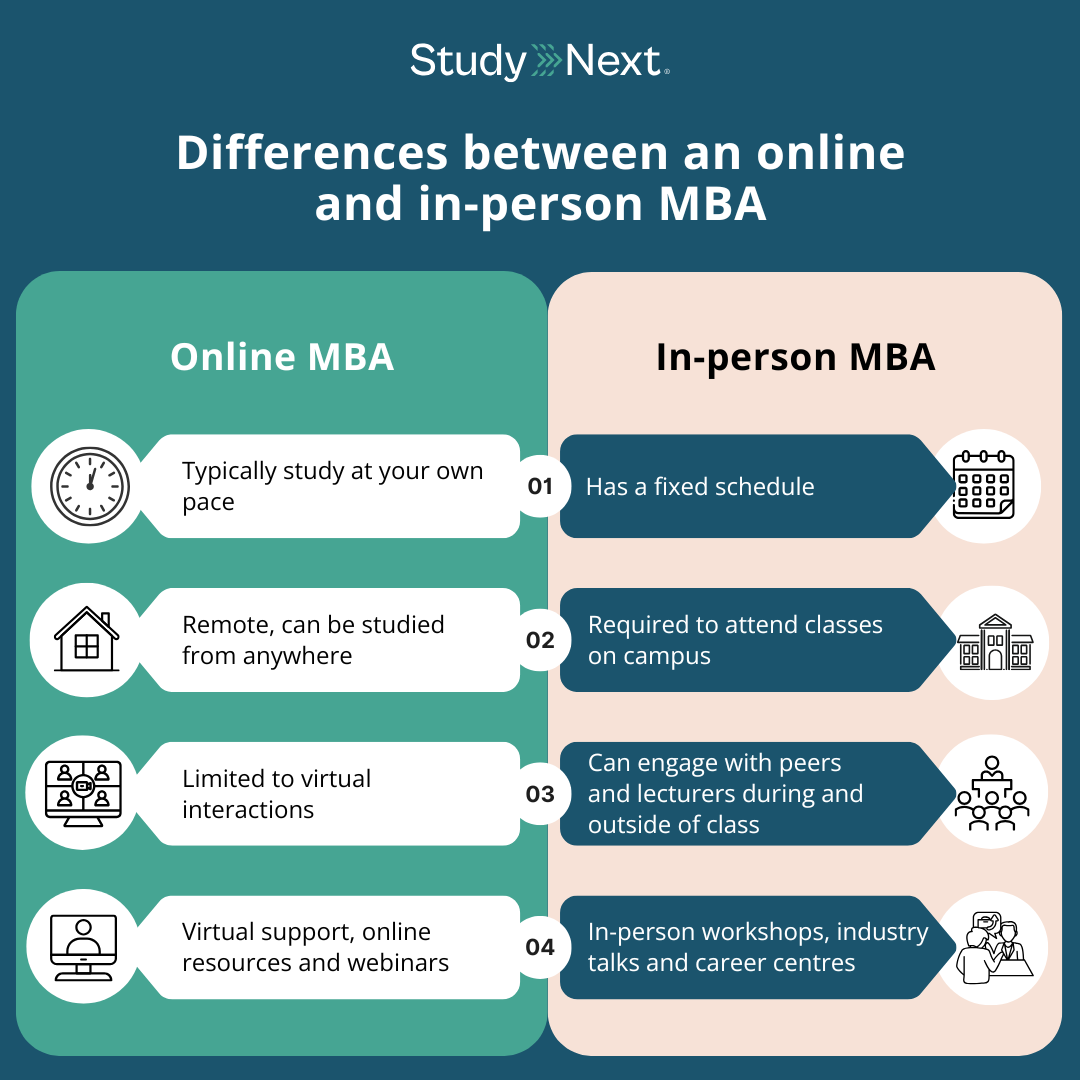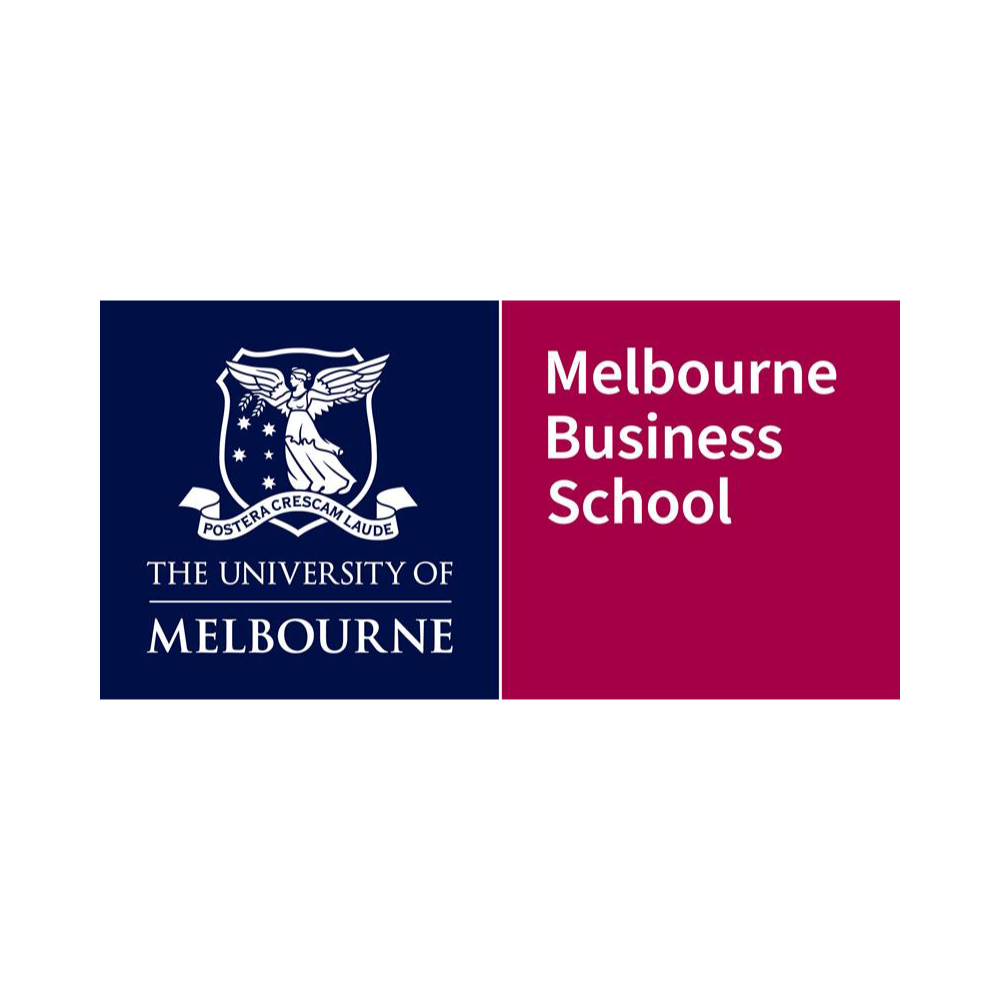
Many working professionals choose to pursue a Master of Business Administration (MBA) to take the next step in their careers. Given the challenge of balancing work and personal responsibilities, many are drawn to online MBAs, which are often seen as the more flexible option. However, studying an MBA course on campus doesn’t mean you have to put your career on hold.
In this article, we delve into the benefits of completing an in-person MBA for working professionals and how you can balance your studies alongside your work and personal life, with insights from an MBA student who’s working full time.
Online MBA vs in-person MBA
While the course content of online and in-person MBA programs may largely be the same, the differences in how they're delivered can significantly impact your learning experience. They can also influence whether you choose to study online or on campus.
Explore these differences below.

Learn more about the contrasts between studying your MBA online and on campus here.
Benefits of studying an on-campus MBA for working professionals
Gaining insight from a working professional who’s completing their MBA on campus can offer you a clearer perspective on the advantages of studying in person.
Alex Meacco, a principal engineer in asset planning at Transurban, is currently doing his MBA at the University of Melbourne. He shares some of the benefits of studying on campus, based on his experience.
Face-to-face engagement with faculty
Being able to connect with your lecturers in person is one of the most valuable aspects of in-person learning. Sharing the same physical space creates a conducive environment where conversations can flow naturally, questions can be answered spontaneously and feedback is immediate.
Alex mentions that in his experience, lecturers tend to engage the room in a fluid way that fosters meaningful conversations. “The in-class experience facilitates that [exchange] more naturally.”
This kind of two-way interaction can also be carried out more efficiently compared to online learning where communication is typically delayed through discussion forums and emails. Even during live virtual sessions, conversations can feel less fluid due to the lack of non-verbal cues. In a face-to-face setting, lecturers can examine your body language, facial expressions and tone of voice to adjust their teaching accordingly. “When you have an online class, there's that brief latency that makes collaboration just a little slower because you can't see the intonation,” he says.
Studying on campus can give you more opportunities to have meaningful interactions with lecturers beyond the classroom. Whether it’s before or after class or during consultation hours at the office, you can exchange ideas and gain clarification on complex course topics. This can also help you build a genuine connection with your lecturers, which can drive your own personal and professional growth.
Soft skill development
Studying an MBA doesn’t just sharpen your knowledge of business fundamentals. You can expect to develop essential soft skills such as communication, teamwork and leadership, especially when you’re involved in group assignments.
You’ll typically be working with a mix of emerging and established leaders in various fields. Navigating different working styles, having discussions and managing deadlines together simulate real-world business challenges, giving you practical experience in leading and influencing others.
Coordinating tasks in a group assignment can also build your collaboration skills. According to Alex, working in silos is counterproductive in group work. “If we’re all learning in discrete parts, [then] you’re missing the purpose, [which is] the group engagement,” he says. Team collaboration is essential for members to work together towards achieving shared goals.
Additionally, improving your soft skills can involve learning from your peers. Leadership styles vary from person to person. By observing and analysing how leaders communicate with their teams, manage conflicts and make decisions, you can gain valuable insights into effective leadership in various scenarios. Alex says that if there’s a natural leader within the group, he prefers to defer to them. “Maybe I'll learn something from how they lead and engage.”
Access to campus facilities and resources
Having access to campus facilities and resources is also a major advantage for MBA students studying on campus. Universities offer dedicated spaces like libraries, discussion rooms and graduate student lounges to provide an environment for learning and group collaboration. These physical resources are designed to support productivity and keep you focused in your MBA studies.
According to Alex, the University of Melbourne has its own building for MBA students. “If there is an in-class group gathering, you go to a breakout room. The [online students] join from the screen, but you go to these breakout rooms which are really nice, small collaborative spaces.”
Besides offering a dedicated learning space for MBA students, the university ensures you're fully supported throughout your journey with diverse career and personal development services. The Career Services team can help you sharpen your skills, grow your professional network and unlock exciting career opportunities through coaching sessions and industry events.
Part-time MBA and Executive MBA students benefit from regular sessions with experienced career coaches. Full-time MBA students can join the Personal Effectiveness Program, which is designed to help you navigate the local job market and learn how to build a career sustainably.


Accelerate your career progression with Australia’s first and market-leading MBA.
The Master of Business Administration (Part-time) is for aspiring leaders who wish to make a difference without putting their lives on hold.
With four intakes a year and flexible study options, you can transform the way you operate at work immediately, under the guidance of the university's top faculty from across the globe.
Propel your leadership journey forward with authentic connections and innovative ideas at Melbourne Business School.


Experience unparalleled academic excellence delivered in a manner that maximises focus and minimises disruptions.
The Executive Master of Business Administration program brings together the sharpest minds in business, each with at least five years of management experience, to delve into the latest management frameworks, insights and knowledge.
Designed with the executive's needs in mind, the program is condensed into 10 on-campus, 4-day residential weekend modules, with one Asia module, over 18 months to minimise disruptions to your responsibilities and schedule.
Invest in your executive capability by exploring the logical and rigorous approaches to business strategy, analysis and management knowledge from various fields, including accounting, economics, finance, information management, marketing, operations, as well as the social and behavioral sciences.
Residential Stay
10 on-campus, four-day residential weekend modules, with one Asia module, over 18 months. During the four-day modules, students will stay on campus at Melbourne Business School from Thursday to Sunday.
This format lets students fully immerse themselves in the program, without the distractions of work and home.


Designed with a focus on practical skills for any business application, the full-time Master of Business Administration (MBA) offers a breadth of knowledge, tools and opportunities to apply what you learn in a real-world setting.
You can choose to study over two years, embracing the full MBA experience or accelerate your pace to move through your subjects quicker, allowing more time for internships, exchange opportunities and career development.
Flexible Length
The program pace can be tailored to match your needs. Study for over two years, embracing the full MBA experience or accelerating your pace to move through your subjects quicker, allowing more time for internships, exchange opportunities, and career development.
Enhanced networking opportunities
“Half of what you're paying for in an MBA is the technical skills that you build in the study and the other 50 per cent is the networking with this diverse group of people,” Alex states, highlighting the importance of connecting with the people you encounter during your MBA journey.
MBA students can come from various backgrounds and disciplines, making it a valuable opportunity to explore and learn from each other. Besides building rapport with your peers, MBA courses typically provide plenty of opportunities for you to connect with industry professionals through industry talks, seminars, workshops, career fairs and other on-campus events.
Before transferring to the University of Melbourne MBA, Alex was studying at the University of Western Australia (UWA). He recalls being present for a guest lecture hosted by the head of the Covid response from the Australian Government. “She walked us through the economics of how that worked, how the government released funds, what decisions they made [and] how they went about them.”
Being around established professionals isn’t just about listening and observing. On these occasions, you have the chance to actively engage with them. You can start meaningful dialogues and gain valuable insights. Opportunities to connect with such experienced individuals are typically rare, so you should take full advantage of what these events have to offer.
Alex explains that the more often you raise your hand to ask questions, the more confident you become in engaging with these accomplished professionals. “Each time, you get a little bit more confident talking to a person who's well above your intellectual level, your pay grade and how much they've seen the world. That exposure is so important.”
In addition to organising a masterclass series featuring some of Australia’s most influential leaders, UWA also provides MBA students with valuable international networking opportunities. For example, you can partake in the annual International Study Program, which is an MBA elective that combines academic lectures with real-world industry visits abroad.
UWA also offers student exchange programs that allow you to take intensive courses at top universities around the world and have them credited toward your MBA. These global learning experiences not only broaden your global perspective but also help you build connections beyond borders.


UWA’s Master of Business Administration (MBA) has a strong focus on current business trends and is highly desirable for professionals looking to move into higher levels of management.
The practical business and leadership skills that you will acquire from an MBA makes it one of the most valuable graduate degrees for your career. An MBA provides you with a competitive advantage in the job market by equipping you with the knowledge, skills and professional network to add immediate value to your organisation. An MBA can also adjust your career goals, lead to new opportunities and open new pathways to success that were not available to you before.
The right MBA can transform your career by changing the way you think about yourself, your potential and the world around you.
An MBA from UWA, Western Australia’s leading university, will give you the very best chance of achieving your career aspirations.
Why UWA?
- As the top-ranked MBA program in Western Australia, there are numerous reasons why a UWA MBA should be your destination of choice.
- Truly world-class teaching faculty that bring their research into the classroom.
- Academically rigorous and highly practical coursework, with a vast selection of elective units.
- A regular masterclass series involving some of Australia’s most prominent leaders.
- The unique UWA MBA Lifelong Learning Program allows your professional development to continue long after graduation.
- Extraordinary networking opportunities in WA’s original and largest MBA program.
- Opportunities to take classes at other Top 100 universities around the world as part of your UWA MBA.


In this accelerated program, UWA's cohort-based MBA offers an accelerated course of study that will enhance your career prospects anywhere in the world. The strong leadership focus is tailor-made for the next generation of leaders and influencers.
The MBA Intensive has one annual intake of 30-35 students, with evening and weekend classes commencing in January each year. You can choose to complete the program in 12 to 18 months, depending upon your own work and personal circumstances. Use the university's Summer and Winter School teaching sessions to accelerate your MBA studies and fast-track your career. Entry is competitive, which ensures you’ll be working alongside the best.
The MBA Intensive has eight core units and four option units. Regardless of the study mode you select, you will complete the majority of your units with the other MBA Intensive students in your cohort, which is a strength of cohort-based MBA programs around the world. For your option units, you will have the opportunity to expand your business network further by studying alongside students in the MBA Flexible program.
The MBA Intensive has the following unique features:
- A year-long Authentic Leadership Program developed by a world-class UWA Leadership School.
- One-on-one mentoring from a senior industry executive.
- Extensive career services support: coaching and workshops via MBA Career Services and industry professionals.
- Strategic Analysis and Consulting Project, working on a real project for one of the university's partner organisations (previously including Woodside, BHP, Rio Tinto and Reconciliation WA).
- Dedicated masterclasses with senior executives and senior managers from top ASX companies and government departments.
- Direct contact with members of the Business School Board.
Immersive and structured learning experience
Being physically present in a classroom creates a consistent routine, helping you to stay motivated and accountable throughout your MBA journey. Having scheduled classes, real-time discussions and in-person collaboration with peers and faculty can foster deeper engagement.
Studying on campus can also remove the external distractions that may occur when learning online in the comfort of your own home, creating a more disciplined environment for study. This method of instruction is especially well-suited for those who need structure and face-to-face interaction to stay focused.
During his bachelor’s studies, Alex realised that watching lecture recordings didn’t capture his interest. He explains that, unlike Netflix documentaries, they aren’t edited and filmed in a way that makes them engaging. "I just knew I didn't have the focus to sit down and watch a recorded lecture.”
Beyond the traditional classroom, campus life offers plenty of opportunities to enrich your MBA experience. From attending industry and networking events to having meals together with classmates during lunch, you’ll find countless ways to engage and build relationships that can make an impact on your professional development. These experiences are what make studying on campus truly immersive, equipping you with the skills and connections needed to thrive in the fast-paced world of business.
Career impact of an on-campus MBA
An on-campus MBA can add great value to your career during your studies and beyond graduation. Here are several ways it can make a meaningful impact on your professional journey:
Work performance
Your MBA experience doesn’t just involve academic learning. It also offers a space where you can experiment with new ideas and make mistakes without the pressure of real-world consequences. The campus setting encourages you to step out of your comfort zone and refine your skills before applying them in your professional role. “It improves my work performance because I'm able to test, trial and learn in a safe environment before I make an impact in the workplace,” says Alex.
You will also have the opportunity to connect with other MBA students coming from various industries and professional backgrounds. This diversity exposes you to different perspectives, approaches and leadership methods.
Alex discusses the variety of people he meets on campus and how he needs to adapt his approach to interacting with them in order to build rapport. “The MBA [provides] the diverse range of people that I don't have at the workplace. The people at the workplace are going to be there for the next one to three years. These people in my class will be rotating. I need to figure out how to build familiarity with them.” Learning how to navigate different working styles and engage with various types of personalities mirrors what you will encounter when you deal with various stakeholders at work.
Leadership style
Alex believes there’s no single “perfect” approach when it comes to leadership. Instead, an effective leader needs to adjust their style to fit the team and the challenges at hand.
“Leadership needs to adapt and no one leader style will fit for every scenario.”
Learning how to become an adaptable leader is a skill you’ll develop during your MBA journey. Whether you're leading group projects or classroom discussions, the campus setting provides opportunities to reflect and try different leadership methods in a supportive environment. This can help you develop the flexibility and emotional intelligence needed to lead in today’s business landscape.
Professional growth
An in-person MBA can be a powerful catalyst for your short-term and long-term professional development. The practical learning environment when you study on campus allows you to apply new and enhanced skills directly to the challenges you face at work. This adds immediate value to your professional role.
In the long run, earning an MBA enhances your credibility, demonstrating to employers that you have the advanced knowledge and leadership capability to take on more senior roles. The connections you build on campus can also expand your professional network, leading to future opportunities.
Alex shares that his promotion during his MBA journey reflects the value senior leaders see in him as it demonstrates his leadership potential. "I was very fortunate to be promoted during the study of my MBA, so I do believe that it supports [my] career,” he says. “I believe that senior leaders do value both additional study and an MBA specifically, because they can see I’m not just an engineer. I’m an engineer with further skills, which means I can lead a broader group of stakeholders.”
Employer perception
Studies suggest that employers often view in-person courses more favourably than their online counterparts.
2023 research from the Graduate Management Admission Council revealed that 54 per cent of employers worldwide view an online graduate management degree, including MBAs, as equally valuable to a degree from an in-person program. However, the majority of them still believe that graduates of in-person courses tend to possess stronger leadership, communication and technical skills.
This finding aligns with another study that’s closer to home. According to a 2023 survey conducted by the Quality Indicators for Learning and Teaching, employers were more satisfied overall with graduates who completed some or all of their studies on campus compared to those who studied entirely online at Australian higher education institutions. These studies highlight the distinct advantages of pursuing an in-person MBA, positioning you to stand out and gain a competitive edge in your career.
Challenges of studying an on-campus MBA
Studying an in-person MBA can come with its own set of challenges. For example, coordinating meetings for group assignments can be difficult when the people in your team have their own personal and professional obligations.
Alex mentions that there’s a lot of calendar juggling involved, which can include 8pm meetings on a Sunday night. “My peers have full-time work and family commitments too. You need to be highly flexible and recognise [that] people have other stuff to do.”
In-person MBAs often require you to sit exams on campus, which can be challenging if they’re scheduled during regular work hours. Alex highlights that at the University of Melbourne, even the part-time MBA exams take place during the workday. In such cases, you’ll most likely need to communicate with your manager or request time off to attend.
Finally, managing the demands of a full-time job alongside your coursework can be tough, especially when you want to make time for your loved ones. While it’s not always easy, tackling these challenges is an essential part of the MBA journey, helping you sharpen your time management and collaboration skills in ways that will enhance your career.
How to achieve work-life balance with your studies
Balancing the demands of work and postgraduate study can be challenging. Below are some strategies to help you maintain a healthy work-life balance while keeping up with your MBA coursework:
Get support from your employer and loved ones
Before embarking on an MBA, it’s important to make sure you have the right support in place to help you succeed. As a working professional, one of the first things to explore is whether your employer offers any benefits or assistance to support further education. For example, the Commonwealth Bank of Australia offers up to 100 per cent financial support and study leave days for employees completing their tertiary studies. KPMG Australia also provides financial and leave assistance for employees pursuing postgraduate education.
Balancing MBA studies with a full-time job often means making sacrifices in your personal life, particularly when it comes to time spent with family and friends. Between classes, assignments, group projects and work commitments, your schedule can leave little room for spending time with loved ones, which can be challenging for all parties. You need to have an honest and open conversation with them prior to starting your MBA journey to help them understand how the qualification is an important investment for your future.
Use productivity tools
Staying on top of MBA classes and coursework can be overwhelming as a working professional. Leveraging productivity tools can help make your learning experience easier for you and keep you organised. For example, task management apps can help you schedule study sessions, track assignment deadlines and set reminders. Note-taking apps can help you record information more efficiently during lectures. Collaboration platforms can make it easier to coordinate group tasks.
Alex shares how productivity tools help him focus more during class. “I record my lectures [and] transcribe them, so I’m taking less notes in class. Instead, I'm in the lecture engaging and thinking,” he says.
By embracing these tools, you can lower your stress levels and create a more structured study routine.
Practice self-care
When you're busy with the demands of work and MBA studies, it's easy to lose sight of who you are beyond your professional and academic responsibilities. The pressure to meet deadlines at work and university can consume most of your time and energy, which can lead to exhaustion and burnout.
Practising self-care can significantly reduce stress and restore a sense of balance in your life. Whether it’s exercising, indulging yourself with your hobbies or going offline for a while, self-care can help remind yourself that your value isn’t solely defined by your productivity or accomplishments.
For Alex, spending time with his wife and taking his dog for a walk are meaningful touch points that anchor his week. He recognises that his personal time has become more limited, but believes it’s a worthwhile compromise. “Maybe you can't do as much of the things that you personally want to do before [since] you now have to give way to some of the more important things,” he says.
Choosing the right course for you
Determine which delivery method suits you best
To answer the question of “Is it better to study online or on campus?”, it ultimately depends on you. Given the significant time and financial investment involved in an MBA, it's important to carefully evaluate which delivery format best aligns with your academic needs and long-term professional goals.
Although studying on campus for your MBA brings a wealth of benefits, some individuals may find online study to suit their personal circumstances and learning styles better. “Maybe they're an introvert [and] don't enjoy the group setting. Maybe the online [format] enables them to learn with their peers, but in a setting that's more comfortable to them,” explains Alex.
He also notes that it’s important to evaluate whether the conditions are suitable if you’re considering studying on campus. “If you have the luxury of proximity [and] the capability to spend time on campus, can you make that work into your existing schedule? Do you need to make any meaningful compromises to be able to do that?”
Pick the right MBA provider
Another key factor to consider is which institution you want to earn your MBA from. You can find a wide range of MBAs in Australia with their own strengths, specialisations and course structures.
In Alex’s case, he started his MBA journey at the University of Western Australia (UWA). Based on his experience, he found the university’s MBA course to be strongly connected to industry and he especially appreciated the flexibility of being able to take exams remotely.
When he later relocated to Melbourne, he transferred his MBA studies to the University of Melbourne, which ranked #1 in the QS Global MBA Rankings 2025. He felt the MBA program offered great prestige and brand recognition, something he believed was well worth the investment.
Ultimately, every institution offers its own unique advantages. Finding the right MBA provider comes down to finding the environment and experience that will best support your development and future ambitions.
Elevate your professional journey with an on-campus MBA
Pursuing further education can be a powerful step in advancing your career. If you're aiming for a leadership position, an MBA can equip you with the necessary skills and strategic insight needed to thrive in today’s competitive business world. Many universities offer on-campus MBAs designed with working professionals in mind, allowing you to continue your career while reaping the benefits of in-person learning and real-time collaboration.
Take the first step to find the right course that aligns with your learning style and schedule. Check out a wide range of MBA courses provided by leading Australian universities.



















